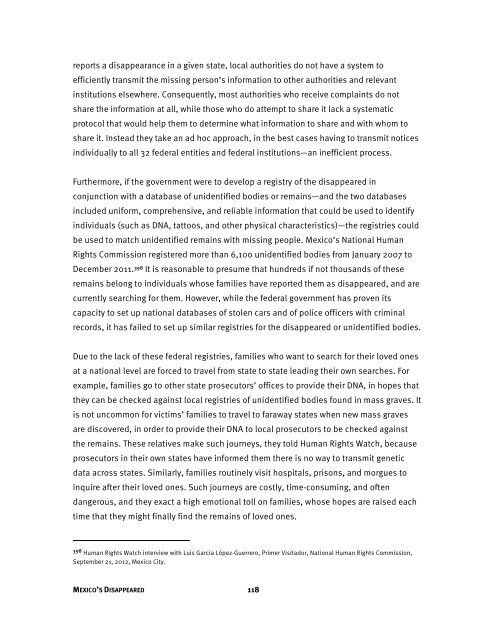Download the full report - Human Rights Watch
Download the full report - Human Rights Watch
Download the full report - Human Rights Watch
Create successful ePaper yourself
Turn your PDF publications into a flip-book with our unique Google optimized e-Paper software.
eports a disappearance in a given state, local authorities do not have a system to<br />
efficiently transmit <strong>the</strong> missing person’s information to o<strong>the</strong>r authorities and relevant<br />
institutions elsewhere. Consequently, most authorities who receive complaints do not<br />
share <strong>the</strong> information at all, while those who do attempt to share it lack a systematic<br />
protocol that would help <strong>the</strong>m to determine what information to share and with whom to<br />
share it. Instead <strong>the</strong>y take an ad hoc approach, in <strong>the</strong> best cases having to transmit notices<br />
individually to all 32 federal entities and federal institutions—an inefficient process.<br />
Fur<strong>the</strong>rmore, if <strong>the</strong> government were to develop a registry of <strong>the</strong> disappeared in<br />
conjunction with a database of unidentified bodies or remains—and <strong>the</strong> two databases<br />
included uniform, comprehensive, and reliable information that could be used to identify<br />
individuals (such as DNA, tattoos, and o<strong>the</strong>r physical characteristics)—<strong>the</strong> registries could<br />
be used to match unidentified remains with missing people. Mexico’s National <strong>Human</strong><br />
<strong>Rights</strong> Commission registered more than 6,100 unidentified bodies from January 2007 to<br />
December 2011. 398 It is reasonable to presume that hundreds if not thousands of <strong>the</strong>se<br />
remains belong to individuals whose families have <strong>report</strong>ed <strong>the</strong>m as disappeared, and are<br />
currently searching for <strong>the</strong>m. However, while <strong>the</strong> federal government has proven its<br />
capacity to set up national databases of stolen cars and of police officers with criminal<br />
records, it has failed to set up similar registries for <strong>the</strong> disappeared or unidentified bodies.<br />
Due to <strong>the</strong> lack of <strong>the</strong>se federal registries, families who want to search for <strong>the</strong>ir loved ones<br />
at a national level are forced to travel from state to state leading <strong>the</strong>ir own searches. For<br />
example, families go to o<strong>the</strong>r state prosecutors’ offices to provide <strong>the</strong>ir DNA, in hopes that<br />
<strong>the</strong>y can be checked against local registries of unidentified bodies found in mass graves. It<br />
is not uncommon for victims’ families to travel to faraway states when new mass graves<br />
are discovered, in order to provide <strong>the</strong>ir DNA to local prosecutors to be checked against<br />
<strong>the</strong> remains. These relatives make such journeys, <strong>the</strong>y told <strong>Human</strong> <strong>Rights</strong> <strong>Watch</strong>, because<br />
prosecutors in <strong>the</strong>ir own states have informed <strong>the</strong>m <strong>the</strong>re is no way to transmit genetic<br />
data across states. Similarly, families routinely visit hospitals, prisons, and morgues to<br />
inquire after <strong>the</strong>ir loved ones. Such journeys are costly, time-consuming, and often<br />
dangerous, and <strong>the</strong>y exact a high emotional toll on families, whose hopes are raised each<br />
time that <strong>the</strong>y might finally find <strong>the</strong> remains of loved ones.<br />
398 <strong>Human</strong> <strong>Rights</strong> <strong>Watch</strong> interview with Luis Garcia López-Guerrero, Primer Visitador, National <strong>Human</strong> <strong>Rights</strong> Commission,<br />
September 21, 2012, Mexico City.<br />
MEXICO’S DISAPPEARED 118

















